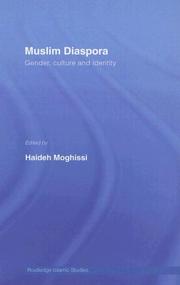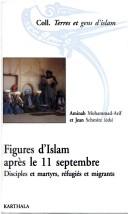| Listing 1 - 7 of 7 |
Sort by
|
Book
ISBN: 9780190279868 Year: 2016 Publisher: New York, NY : Oxford University Press,
Abstract | Keywords | Export | Availability | Bookmark
 Loading...
Loading...Choose an application
- Reference Manager
- EndNote
- RefWorks (Direct export to RefWorks)
Muslims beyond the Arab World explores the tradition of writing African languages using the Arabic script 'Ajami and the rise of the Muridiyya order of Islamic Sufi in Senegal. The book demonstrates how the development of 'Ajami and the flourishing of the Muridiyya are entwined.
Muslim diaspora. --- Murīdīyah. --- Ajami alphabet. --- Murīdīyah --- Diaspora musulmane --- History. --- Bāmbā, Aḥmadū,

ISBN: 0415770815 9780415770811 Year: 2006 Publisher: London ; New York : Routledge,
Abstract | Keywords | Export | Availability | Bookmark
 Loading...
Loading...Choose an application
- Reference Manager
- EndNote
- RefWorks (Direct export to RefWorks)
Ethnology --- Muslim diaspora. --- Islam --- Islam and culture. --- Multiculturalism. --- Gender identity --- Anthropologie sociale et culturelle --- Diaspora musulmane --- Islam --- Islam et civilisation --- Multiculturalisme --- Identité sexuelle --- Customs and practices. --- Coutumes et pratiques --- Pays musulmans
Book
ISBN: 1442687878 9781442687875 9780802097873 0802097871 9780802095435 0802095437 1442692588 Year: 2009 Publisher: Toronto Buffalo, NY
Abstract | Keywords | Export | Availability | Bookmark
 Loading...
Loading...Choose an application
- Reference Manager
- EndNote
- RefWorks (Direct export to RefWorks)
This book challenges the common misperceptions of Muslim immigrants as a homogeneous, religiously driven group and identifies the tensions they experience within their host countries.
Muslims --- Muslim diaspora. --- Mohammedans --- Moors (People) --- Moslems --- Muhammadans --- Musalmans --- Mussalmans --- Mussulmans --- Mussulmen --- Religious adherents --- Islam --- Diaspora, Muslim --- Islamic diaspora --- Human geography --- Research. --- Migrations --- Canada. --- Canada (Province) --- Canadae --- Ceanada --- Chanada --- Chanadey --- Dominio del Canadá --- Dominion of Canada --- Jianada --- Kʻaenada --- Kaineḍā --- Kanada --- Ḳanadah --- Kanadaja --- Kanadas --- Ḳanade --- Kanado --- Kanakā --- Province of Canada --- Republica de Canadá --- Yn Chanadey --- Musulmans --- Diaspora musulmane. --- Recherche.

ISBN: 2845867549 9782845867543 Year: 2006 Publisher: Paris : Karthala,
Abstract | Keywords | Export | Availability | Bookmark
 Loading...
Loading...Choose an application
- Reference Manager
- EndNote
- RefWorks (Direct export to RefWorks)
Jihad --- Muslim diaspora --- Noncitizens --- Refugees --- Jihād --- Diaspora musulmane --- Immigrants clandestins --- Réfugiés --- Migration, Internal - Middle East --- Migration, Internal - Africa, North --- Refugees - Islamic countries --- September 11 Terrorist Attacks, 2001 - Influence --- Islamic fundamentalism --- Islamic countries - Emigration and immigration --- Migration, Internal --- September 11 Terrorist Attacks, 2001 --- Islamic countries
Book
ISBN: 9782503555256 250355525X 2503562140 Year: 2015 Volume: 5 Publisher: Turnhout Brepols
Abstract | Keywords | Export | Availability | Bookmark
 Loading...
Loading...Choose an application
- Reference Manager
- EndNote
- RefWorks (Direct export to RefWorks)
The eleven essays brought together in this volume explore the relations between expulsion, diaspora, and exile between Late Antiquity and the seventeenth century. The essays range from Hellenistic Egypt to seventeenth-century Hungary and involve expulsion and migration of Jews, Muslims and Protestants. The common goal of these essays is to shed light on a certain number of issues: first, to try to understand the dynamics of expulsion, in particular its social and political causes; second, to examine how expelled communities integrate (or not) into their new host societies; and finally, to understand how the experiences of expulsion and exile are made into founding myths that establish (or attempt to establish) group identities.
Jewish diaspora --- Jews --- Muslim diaspora --- Muslims --- Group identity --- Toleration --- Diaspora juive --- Juifs --- Diaspora musulmane --- Musulmans --- Identité collective --- Tolérance --- Migrations --- History --- Religious aspects --- Histoire --- Aspect religieux --- 27 <08> --- 27 <08> Histoire de l'Eglise--Verzamelwerken. Reeksen --- 27 <08> Kerkgeschiedenis--Verzamelwerken. Reeksen --- Histoire de l'Eglise--Verzamelwerken. Reeksen --- Kerkgeschiedenis--Verzamelwerken. Reeksen --- Identité collective --- Tolérance --- Exiles --- Religions --- Civilization, Medieval --- Christianity and culture --- Europe --- Emigration and immigration --- Identification (Religion) --- Congresses --- Ethnicity --- Ethnic relations --- Forced migration --- Social aspects --- Religious aspects. --- Religion: general --- Exiles - Europe - History - To 1500 - Congresses --- Religions - History - Congresses --- Jewish diaspora - Congresses --- Muslim diaspora - Congresses --- Civilization, Medieval - Congresses --- Christianity and culture - History - Middle Ages, 600-1500 - Congresses --- Europe - Emigration and immigration - History - To 1500 - Congresses
Book
ISBN: 9780748645503 0748645500 9780748689842 9780748645510 9780748654796 0748654798 1322981426 1784023582 0748645519 9780748654789 Year: 2013 Publisher: Edinburgh Edinburgh University Press
Abstract | Keywords | Export | Availability | Bookmark
 Loading...
Loading...Choose an application
- Reference Manager
- EndNote
- RefWorks (Direct export to RefWorks)
"This comparative approach to the various uses of the ethnographic method in research about Islam in anthropology and other social sciences is particularly relevant in the current climate. Political discourses and stereotypical media portrayals of Islam as a monolithic civilisation have prevented the emergence of cultural pluralism and individual freedom. Such discourses are countered by the contributors who show the diversity and plurality of Muslim societies and promote a reflection on how the ethnographic method allows the description, representation and analysis of the social and cultural complexity of Muslim societies in the discourse of anthropology"--Provided by publisher.
Religious life --- Islam --- Rites and ceremonies --- Pluralism --- Muslim diaspora --- Muslims --- Islam and civil society --- Customs and practices --- Rituals --- Religious aspects --- Ethnic identity --- Muslim diaspora. --- Islam and civil society. --- Diaspora musulmane --- Islam et société civile --- Customs and practices. --- - Islam --- Coutumes et pratiques --- Islam et société civile --- Sociology of religion --- Cultural pluralism --- Vie religieuse --- Rites et cérémonies --- Musulmans --- Islam. --- Rituals. --- Rituel --- Identité ethnique --- Diaspora musulmane. --- Islam et société civile. --- Kulturanthropologie. --- Onderzoeksmethoden. --- Pluralisme (Philosophie) --- Rites and ceremonies. --- Rites et cérémonies --- Ritual. --- Coutumes et pratiques. --- Rituel. --- Ethnic identity. --- Identité ethnique. --- Aspect religieux --- Islamic countries. --- Religious life - Islam --- Islam - Customs and practices --- Rites and ceremonies - Islamic countries --- Islam - Rituals --- Pluralism - Religious aspects - Islam --- Muslims - Ethnic identity --- Civil society and Islam --- Civil society --- Mohammedans --- Moors (People) --- Moslems --- Muhammadans --- Musalmans --- Mussalmans --- Mussulmans --- Mussulmen --- Religious adherents --- Diaspora, Muslim --- Islamic diaspora --- Human geography --- Monadology --- Monism --- Philosophy --- Reality --- Sharia (Islamic religious practice) --- Ceremonies --- Cult --- Cultus --- Ecclesiastical rites and ceremonies --- Religious ceremonies --- Religious rites --- Rites of passage --- Traditions --- Ritualism --- Manners and customs --- Mysteries, Religious --- Ritual --- Islamic religious practice --- Religious life (Islam) --- Migrations --- Shīʻah
Book
ISBN: 9781409402879 1409402878 9786612892226 1409402886 1282892223 1317091175 1317091183 9781409402886 9781315597058 9781317091165 9781317091172 9781138260665 1315597055 9781317091189 9781282892224 6612892226 Year: 2010 Publisher: Farnham, Surrey, UK ; Burlington, VT : Ashgate,
Abstract | Keywords | Export | Availability | Bookmark
 Loading...
Loading...Choose an application
- Reference Manager
- EndNote
- RefWorks (Direct export to RefWorks)
In view of the growing influence of religion in public life, Muslim Diaspora in the West offers a timely contribution to scholarly debates and concerns raised in the West about Islam and Muslims within diaspora. Presenting the latest research from a variety of locations on both sides of The Atlantic, this volume will be of interest to scholars with interests in race and ethnicity, cultural, media and gender studies, and migration.
Muslim diaspora. --- Muslims --- Diaspora musulmane --- Musulmans --- Social conditions --- Conditions sociales --- #SBIB:39A6 --- #SBIB:316.8H16 --- #SBIB:316.346H29 --- Muslim women --- Muslim families --- Islam --- Multiculturalism. --- Cultural diversity policy --- Cultural pluralism --- Cultural pluralism policy --- Ethnic diversity policy --- Multiculturalism --- Social policy --- Anti-racism --- Ethnicity --- Cultural fusion --- Islamic religious practice --- Sharia (Islamic religious practice) --- Diaspora, Muslim --- Islamic diaspora --- Human geography --- Families, Muslim --- Families --- Islamic women --- Women, Muslim --- Women --- Etniciteit / Migratiebeleid en -problemen --- Welzijns- en sociale problemen: migranten, rassenrelaties --- Positie van de vrouw in de samenleving: andere topics --- Customs and practices. --- Government policy --- Migrations --- Islam -- Customs and practices. --- Muslim families -- Western countries. --- Muslim women -- Western countries. --- Muslim diaspora --- Religion --- Gender & Ethnic Studies --- Social Sciences --- Philosophy & Religion --- Gender Studies & Sexuality --- Customs and practices --- Muslimahs
| Listing 1 - 7 of 7 |
Sort by
|

 Search
Search Feedback
Feedback About UniCat
About UniCat  Help
Help News
News